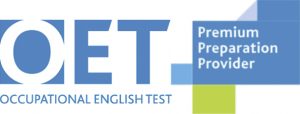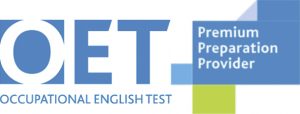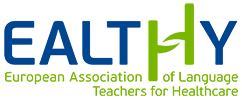The Occupational English Test (OET) is used in the UK, Australia, New Zealand and Singapore among others to assess the Medical English skills of a wide range of international healthcare professionals, including doctors, nurses and AHPs.
OET Background
The OET was established in the late 1980s, and developed under contract to the Australian Government. It was designed by Professor Tim McNamara at the University of Melbourne – one of the original developers of IELTS.
Since then it has undergone continuous assessment and review, led by the Language Testing Research Centre (LTRC) at the University of Melbourne, in order to ensure it is fit for purpose today. LTRC is an international leader in research and development in language assessment.
The test is now owned by Cambridge Boxhill Language Assessment, a joint venture between Cambridge English Language Assessment (who co-own IELTS) and Box Hill Institute, a leading vocational and higher education provider.
OET Objectives
The OET is designed specifically to assess the English language skills of international healthcare professionals wanting to work in an English-speaking environment and reflects over 30 years of research and practice.
It consists of 4 papers: Listening and Reading cover a broad range of generally applicable healthcare topics, while Speaking and Writing target the specific areas required by 12 professions within healthcare.
These are: Dentistry, Dietetics, Medicine, Nursing, Occupational Therapy, Optometry, Pharmacy, Physiotherapy, Podiatry, Radiography, Speech Pathology, Veterinary Science
OET Test Format
There are 4 skills-based papers: Listening, Reading, Writing, Speaking.
The Listening and Reading papers are designed to assess a candidate’s ability to understand spoken and written English, based on health-related topics and tasks common to all professions.
The Writing and Speaking papers are specific to the 12 individual healthcare professions – designed to reflect common tasks performed in the workplace.
OET Scores
| OET Score |
| A: Very High Level of Performance |
| B: High Level of Performance, able to use English adequately for professional needs |
| C: Good Level of Performance, but not acceptable to a range of health and medical councils |
| D: Moderate Level of Perfomance, requires improvement |
| E: Low Level of Performance, requires considerable improvement |
International candidates need to score a minimum of B in all 4 papers in order to achieve the standard required by those regulatory bodies that recognise the OET’s validity.
OET Test Fees
In 2017, the test fees were AUD $587, approximately £350.
OET Recognition
The OET is recognised by over 20 regulatory healthcare bodies and councils in the UK, Australia, New Zealand, Singapore, Dubai and Namibia. These include the UK Nursing and Midwifery Council (NMC), the Australian Health Practitioner Regulation Agency (AHPRA), the Nursing and Midwifery Councils of New Zealand, and the Singapore Medical Council. OET is also recognised by the Australian Department of Immigration and Border Protection and many Australian universities and healthcare education bodies, including the Australian College of Nursing.
See for more details visit: https://www.occupationalenglishtest.org/
OET Preparation with Specialist Language Courses

SLC is delighted to announce that we are the first training company in the UK and Europe to be accredited by the OET as a Premium Provider – one of only 5 worldwide. SLC designs and arranges OET Preparation courses so learners can achieve the score they need. Courses can be:
• Group courses for NHS Trusts, private healthcare organisations and international recruitment companies
• Online preparatory course - English for Nurses: Getting the Essentials Right
Contact us for full details.
About the Author
Chris Moore is Managing Director of Specialist Language Courses (SLC), an international business and technical language training consultancy, with a specialism in training healthcare professionals. SLC works with companies around the world to improve their language capabilities. OET is now widely used across the UK, Australia, New Zealand and Singapore to assess whether international nurses have sufficient English to work in those countries.
Please contact Chris on chris@specialistlanguagecourses.com or on +44 1273 900213 to discuss how you can best prepare your workforce for the OET test.







